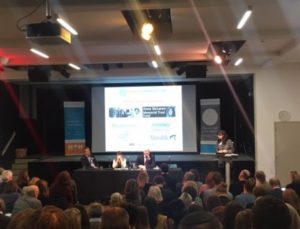Make Do or Amend: Should We Update UK Fertility and Embryo Law?
Progress Educational Trust received an institutional grant to fund the attendance of eight medical students at their annual conference 'Make Do or Amend: Should We Update UK Fertility and Embryo Law?', December 2018. Read their report below

The Progress Educational Trust (PET) is an independent registered charity founded in 1992 to advance public understanding of ethics, law and science in the fields of human genetics, assisted reproduction and embryo/stem cell research.
PET works to improve choices for people affected by infertility and genetic conditions, and to promote the responsible application of science through education and debate.
PET’s discussion conference Make Do or Amend: Should We Update UK Fertility and Embryo Law?, which was held at Amnesty International in London, on 5 December 2018, explored law and regulation governing fertility treatment and embryo research.
In the PET tradition, following introductory presentations the bulk of each session’s running time was devoted to soliciting questions and comments from the audience.
Conference sessions included:
The Human Fertilisation and Embryology Act: Is It Broke and Should We Fix It?
Society Marches On: Key Social Changes
Science Marches On: Key Scientific Developments
New Science, New Families, Old Law: Is the Human Fertilisation and Embryology Act Fit for Purpose?
A Patchwork of Policies: Assisted Conception and Embryo Research in Europe
The Future of Fertility Law: What Must Change and When?
How the Institute of Medical Ethics made a difference
By funding places for eight medical students to attend the conference free of charge, the Institute of Medical Ethics (IME) made the event substantially more accessible. The medical students who made use of these places, contributing to the 220-strong audience, were from the Universities of Birmingham, Sheffield and Liverpool and from Manchester Metropolitan University. One student also attended from Australia’s Monash University, currently a visiting student at the Oxford Uehiro Centre for Practical Ethics.
Thanks to the IME, it was possible for these students to participate in an event whose cost would otherwise have been prohibitive – especially when combined with the cost of travel.
Furthermore, association with a body such as the IME gives an imprimatur of quality to the event. Prospective delegates who are unfamiliar with PET’s work in bioethics are given confidence that the conference will be of a high standard.
Feedback from attendees:
220 people attended the PET conference, of the attendees who completed feedback forms, 100 per cent rated the conference as either excellent or good overall, and 97 per cent said they were better informed as a result of attending.
Several of the students who received sponsored places gave specific feedback:
Charlotte McDowell (University of Sheffield):
‘I’m a third-year medical student planning to intercalate in medical ethics and law next year. I find the topic of surrogacy to be particularly interesting, and I went to the event in the hopes of getting a better understanding of the current ethical and legal issues. The event was very engaging, and I really enjoyed it. All of the speakers were interesting and well selected. The talks given only furthered my interest in intercalating in medical ethics and law. I also have to write an essay for my applications for intercalated degrees, and I decided as a result of the event to write about the ethical issues surrounding commercial surrogacy. I would like to thank the IME for kindly subsidising places, as I could not have attended without this.’
Lucy Benham Whyte (Manchester Metropolitan University and University Hospital Coventry):
‘I am extremely grateful for the subsidised place that was available to me, since I would not have been able to afford to come to London on the student budget alone. This particular event was extremely relevant to my studies as a trainee embryologist, and I feel my level of knowledge in regard to embryo and fertility law is much more advanced as a result. I hope I will be able to attend many PET conferences in the future.’
Lydia di Stefano (Monash University):
‘I found the conference really interesting and helpful to complement the biomedical perspectives I have heard about assisted reproductive technologies at medical school. I would not have been able to attend the conference without being sponsored.’
Sam Calmonson (University of Birmingham):
‘I was able to attend the Progress Educational Trust conference thanks to the IME. It was fantastic opportunity to increase my knowledge about the topic. All the speakers gave an interesting insight into their views, and the short presentations helped to keep the conference moving, whilst generating debate and conversation. As a medical student, this was an interesting day away from the main course that I would highly recommend to anyone interested in ethics.’
